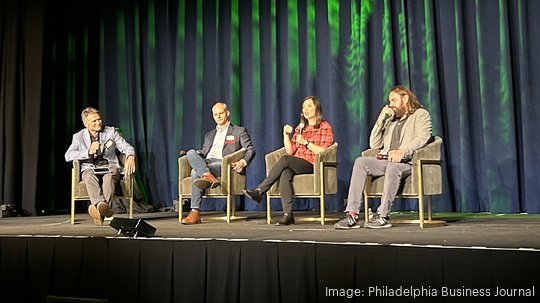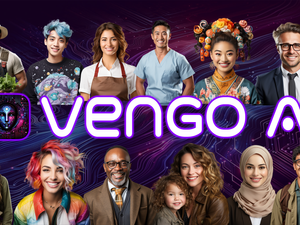
Artificial intelligence is advancing exponentially and some of the top tech minds in Greater Philadelphia say companies need to find ways to incorporate it into their businesses before they are left behind. That means finding practical use cases that span both bottom-up and top-down approaches.
That was a key takeaway from AI leaders at Comcast, Guru and the National Science Foundation, who spoke during the Philadelphia Alliance for Capital and Technologies' annual Phorum event on Tuesday.
"At this moment, this is going to be the smallest gap between those who work and use AI and those who do not because the AI is advancing exponentially," said Sophia Velastegui, former chief AI technology officer at Microsoft and a current member of the National Science Foundation's AI Advisory Committee. "That will not stop because AI is also leveraging each other. That's why some of the growth you're seeing will actually accelerate."
Both Rick Nucci, founder of Philadelphia-based AI knowledge management platform Guru and Conshohocken-based cloud software firm Boomi, and Rick Rioboli, the chief technology officer of Comcast Cable, were early adopters of AI. Still, they are calculated about how it's implemented across their companies.
All three pointed to customer service chatbots as a practical use case, noting chatbots can undertake information retrieval from troves of internal documents and automate documentation.
Still, they agreed the approach to adding AI should be measured and not "to just engage haphazardly," Velastegui said.
Submit a nomination for PHL Inno's 2024 Fire Awards
At Comcast, Rioboli said they are taking both a top-down and bottom-up approach. The top-down approach includes more major, long-term projects where the Philadelphia tech and media company can implement AI, like the Xfinity Voice Remote. The bottom-up approach affects employees in their day to day and makes internal operations more efficient. Rioboli said they are framing their internal AI tools as "assistants" or "copilots" for employees in positions like software development or technicians in the field.
One way Comcast has implemented AI is by deploying GitHut Copilot to 10,000 of its software developers, which can assist them with programming and coding.Another example is its platform called "Ask Me Anything." Frontline technicians use it to retrieve information from Comcast's existing knowledge base to provide assistance and troubleshoot solutions in everyday situations. It's been deployed to upwards of 6,000 employees thus far and next month will roll out to all call centers, or an additional 35,000 agents.
Comcast is also exploring tools like document management and search for its legal team and ways creative teams can leverage AI, Rioboli added.
At Guru, Nucci said the best use cases for AI is in operations roles, specifically in what he called "people ops, sales ops and internal IT." In those areas, he said AI can help human resources teams track and retrieve data about their employees, help employees answer technology questions and onboard sales representatives quicker.
While Guru is adopting the technology, Nucci warned that companies should consider a low-risk approach at the start. He noted that trying to move too quickly into AI technology that isn't yet fully developed for widespread adoption could be a "disaster."
Nucci said that the dialogue around AI adoption at a company should be two-fold: "What do we think we could do in three years? And what can we do right now with where the technology is today?"
Both of those questions should yield different approaches and companies should ground their AI implementation in the problems they're facing today, Nucci said.
Velastegui added that the infatuation with generative AI of late poses another potential risk. Given the widespread use of AI, it's all the more important for companies to learn its risks in a safe, operational way and prepare employees for its use going forward.
"Technology inherently is about change and advancement and leveraging itself around it," Velastegui said. "So is there a workforce that's curious to learn about it so we can be intentional and master it to get the business value?"







